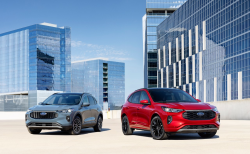
—
A Ford hybrid battery lawsuit alleges Ford and Lincoln customers in Canada are stuck with vehicles they can’t use as advertised.
The Ford Canada class action lawsuit includes 2020-2024 Ford Escape Hybrids and 2020-2024 Lincoln Corsair Hybrids that were recalled in January.
The plug-in hybrid electric vehicles (PHEVs) were recalled due to problems with the lithium-ion batteries that could catch fire. Ford says the battery could fail or catch fire because the “cell’s separator layer between its cathode and anode may be susceptible to damage as a result of the cell manufacturing process.”
The Ford Escape Hybrid and Lincoln Corsair Hybrid batteries can short-circuit if the separator is damaged.
According to the lawsuit, Ford told vehicle owners it was working on collecting the necessary parts to repair the vehicles, but the owner who sued contends customers must spend money on fuel instead of depending on the electric features.
Ford Hybrid Battery Lawsuit — The Plaintiff
The Ford hybrid class action lawsuit was filed by Sara Davies who says she purchased a 2021 Ford Escape Hybrid to save money on gasoline and car repairs. The plaintiff and her husband determined by plugging in the vehicle overnight, they could do most of their day-to-day driving using the electric battery rather than the internal combustion engine.
“They found that it worked very well for their daily routine – in general, they were able to charge it overnight and run the car on the electric motor for 99% of the day-to-day commuting and work they did.” — Ford hybrid class action lawsuit
But in February, the couple received a recall letter which says their Escape Hybrid “may contain a safety defect that could affect the safety of a person,” and “a manufacturing defect in one or more of your vehicle’s high voltage battery cells may cause the cell to develop an internal short circuit.”
According to the Ford hybrid battery recall:
“You should immediately refrain from charging your vehicle to maintain a lower charge level in the high voltage battery, reducing the risk of a fire until a remedy is available.”
The couple immediately stopped charging their vehicle overnight which means they can no longer run their day-to-day errands using the electric motor.
“As a result, they are incurring additional cost for gasoline (and wear and tear on the engine) because they cannot charge the vehicle overnight. Although Ford has promised that a repair will come in the second quarter of 2025, nothing has been provided yet. Meanwhile, Ms. Davies is stuck with a ‘plug-in’ vehicle that she cannot plug in.” — Ford Canada hybrid battery lawsuit
The Ford hybrid battery lawsuit was filed in the Ontario Superior Court of Justice: Sara Davies v. Ford Motor Company, et al.
The plaintiff is represented by Charney Lawyers PC.

